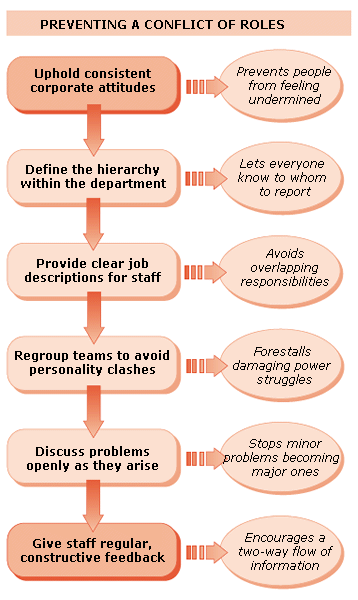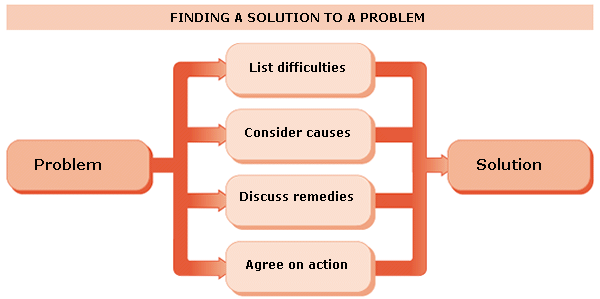Once you have recognized that someone is under stress and have started to understand the reasons for it, the hardest part begins: making that person aware of what you have observed, and encouraging them to take corrective action.
Understanding tension areas
Always be aware of the work your staff have to cope with on a daily, weekly, monthly, and annual basis. You will then better understand the pressures they may be under at any given time. Tensions may arise as a result of competition between colleagues whose jobs are either very similar or have several overlapping aspects. In most instances, you need not worry about competitive tensions; encourage those directly involved to work things out between themselves. If you become aware that a situation may escalate into a problem, prevent role conflict by defining clearly what is expected of each party.

Assessing relationships
In many ways, the personal relationships that exist between colleagues are just as important as their professional relationships. As a manager, try to be aware of who gets along with whom. Once you have a clear understanding of the personal relationships around you, you can start to build up teams of people who work well together.
Helping others admit to stress
Sometimes a subtle, indirect approach is needed to help others admit to stress. Social relationships can cut across the roles and hierarchies found in the workplace – in some cases it may be appropriate to involve a third party. This is one point where you will find it useful to know who gets on well with whom. A discreet word with the right person can reap great rewards, and is a helpful and tactful way – as a first attempt, at least – to bring someone’s attention to their own stress levels. This will avoid the person’s stress becoming an official issue and may enable them to remedy the situation. A more direct approach may be necessary if this does not work.
Table Barriers to admitting stress
For managers | |
For colleagues
| |
For subordinates
| Subordinates may feel that their careers will suffer if they show signs of stress to staff who have a degree of control over their jobs. Subordinates may not want to show signs of weakness to senior staff.
|
Implementing action
Once stress is recognized and acknowledged, devise a strategy to help the sufferer deal with it. Ask both subordinates and colleagues if they have any suggestions on how to reduce their own workload, for example, by delegating some aspects of their role to someone else. Discuss all possible courses of action that can be taken. Always endorse alternative arrangements, so that the person under stress does not feel they are letting others down.

Supporting others
Occasionally you will need to support others who are in the middle of a stressful situation. Take a calm, logical approach and follow these steps:
Taking time to listen
Any discussion with a stressed colleague or subordinate should take place in confidence in a meeting room. Make as much time available as is necessary.
Discuss the problems that the individual is experiencing, and determine the underlying causes of their stress – find out whether their problem is work-related or personal;
Having analyzed the type of stress from which the person is suffering, discuss what help they would find most useful – this might take the form of work-related help (such as training), emotional help (such as counselling), or medical help (such as treatment for a condition brought on or aggravated by stress);
Assist the individual in finding the help they need. Be prepared to suggest alternative solutions in case they are unhappy with your initial suggestions and recommendations.
Sharing knowledge and experience
It is sometimes possible to indicate subtly certain courses of action that can be taken to reduce stress levels without suggesting that any one individual member of staff has a problem. For example, everyone knows that time management can cause problems, so it is a good idea to pool your knowledge and ideas on how to streamline the day. Be blatant about introducing time-saving techniques and encourage awareness of stress patterns. Make general statements such as “I couldn’t survive without my wallchart”, or “I always need at least 15 minutes before I go into a meeting to prepare myself”. Make colleagues aware that all brilliant leaders need their crutches. Mention areas that you personally find stressful and share solutions that have been successful for you.
TIP
Keep a note of situations that trigger stress in your colleagues.
TIP
Ensure that staff working together are compatible.
TIP
List all the people who may be able to help a colleague under stress.
TIP
Encourage staff to be supportive of one another.
TIP
Suggest that your meetings should last no longer than half an hour.
TIP
Ask colleagues to prioritize tasks in their diaries.
TIP
When talking with a colleague, banish all interruptions.